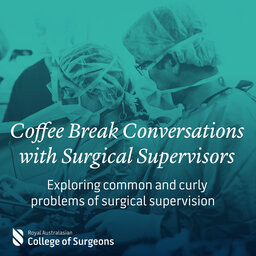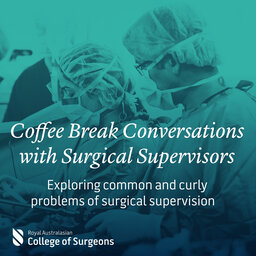Health Advocacy - Part1
This episode on Health Advocacy is in 2 parts.
Part 1 focuses on Health Advocacy of the Surgeon – that is how surgeons advocate for the benefit of the recipients of healthcare. How supervisors can teach and assess competence in Health Advocacy.
Part 2 will be about Health Advocacy for the Surgeon – where we will focus on the wellbeing of the surgeon.
Guest for part 1 is Dr Neill Boustred, an Australian-based Ear Nose and Throat Surgeon. He completed his post-graduate training in South Africa and Sydney and is a Fellow of the South African and Australian Colleges of Surgery. He is also a member of the Australian and American Societies of Otolaryngologists.
He has Worked in Australia in the North Shore area of NSW since 1997 at Hornsby Hospital and the Sydney Adventist Hospital. He also holds positions at Concord Hospital and Macquarie University Hospital. He is a senior lecturer at Sydney and Macquarie Universities.
He is the immediate past Chair of the board of Otolaryngology, Head and Neck Surgery for Australia and New Zealand and remains closely involved in the teaching of both postgraduate and undergraduates in Australia and in Southeast Asia.
Questions
In this podcast we discussed Neill’s thoughts on the following:
1. Being competent in the area of Health Advocacy?
2. What patients and the community might expect from surgeons and the provision of healthcare?
3. Some effective ways to assess whether a trainee or SIMG meets the expected standard of Health Advocacy?
Summary
Key take-home points from the conversation with Dr Neill Boustred around Health Advocacy in relation to Health Advocacy for the recipients of healthcare were:
1. Understand what health advocacy is in relation to the context in which you work. Be it a large tertiary centre or a small community.
2. Have genuine care and concern for:
- individual patients, their wants and needs and their communities.
- the people who work within the system.
- the provision of optimal care for the individual based on the bigger picture for that person – not a treatment modality that is just based on the disease. Social determinants of healthcare
- sustainability of the healthcare system as a whole. Financial and environmental
3. Be a role model for trainees and SIMGs.
4. It’s important to dedicate time to focus on how a trainee is performing and progressing.
5. You can incorporate teaching and assessing health advocacy in many settings using different assessment methods including:
- Direct observation of practice
- Case-based discussions
- MDT / M &M meetings
- Mini CEX
- Essays
- Exams
6. Feedback – honest, timely, regular and give the trainee the opportunity to act on the feedback and improve.
We look forward to sharing more in Part 2 of Health Advocacy, where we will discuss Health Advocacy for the wellbeing of the surgeon.
To provide feedback, suggest topics for discussion, share ideas or offer to be a guest, please complete the feedback survey via the following link https://forms.office.com/r/xP3uWrGQ6K or email Catherine Hunt Medical Educator RACS Catherine.Hunt@surgeons.org
Supervisor Support Hub | RACS (surgeons.org)
RACS Professional Skills Curriculum | RACS (surgeons.org)
In 1 playlist(s)
Coffee Break Conversations with Surgical Supervisors
Surgeons’ roles are diverse, with many demands placed on their time and attention. Supervising Train…Social links
Follow podcast
Recent clips

Judgement and clinical decision making with Dr Rebecca Garland
33:47

Health Advocacy - Part 2
26:31

What makes a great surgical supervisor?
32:09
 Coffee Break Conversations with Surgical Supervisors
Coffee Break Conversations with Surgical Supervisors